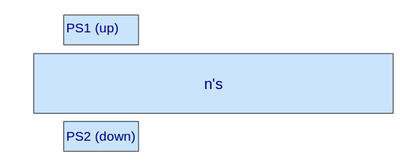05/09/2011
I did some counts test like:
The powers were:
PS1 and PS2: -1000 V n's: -1100 V
The PMT for n's detectors is PMT HAMAMATSU R580 with supply voltage 1250/1500 V. But I have used the value above, because I though the counts rate was reasonable. See my table below.
The thresholds were:
PS1 and PS2: -80 mV n's: -60 mV
Let see what we have. First he CF-243 source is far far away (sealed in the safe):
| counts/min (1 min test) | counts/min (1 min test) | counts/min (5 min test) | counts/min (5 min test) | |
|---|---|---|---|---|
| !PS1 | 153 | 170 | 132.4 | |
| PS2 | 150 | 173 | 175.6 | |
| PS1+PS2 | 3.8 | 5.8 | ||
| n's | 358 | 373.6 |
Second the CF-243 source is somewhere aside (on the table 40 - 60 cm away from detectors. That test supposed to be initially as test without CF243 source and I just put the isotope away from detectors somewhere on the table, but as happened the PS detectors was able to see the source):
| counts/min | counts/min | |
|---|---|---|
| PS1 | 373 | 362 |
| PS2 | 654 | 656 |
| PS1+PS2 | 2.0 | 6.0 |
| n's | 358 |
Third the CF-243 source is on the top of PS1:
| counts/min | counts/min | |
|---|---|---|
| PS1 | 364,570 | 363,477 |
| PS2 | 19,832 | 19.980 |
| PS1+PS2 | 993 | 959 |
| n's | 369 | 352 |
What about the PS's detectors. I can concluded that detectors works good, detects the cosmic, and increase the counts as the external source approaches the detectors.
What about the n's detector. The counts rate is basically the same with and without the source CF243. So what we are really detect? Cosmic? Then why the rate does not depend from source. Some internal noise? But why the count rate are so big?
I am going to increase the power supply for HAMAMATSU, adjust threshold and see what happens.
